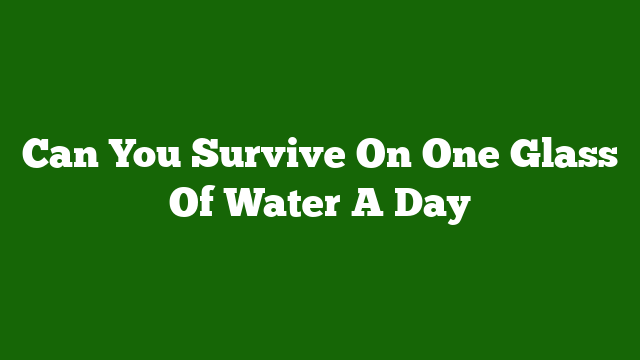Last Updated on June 12, 2023 by Umar
Water is an essential element of life, and without it, there would be no people, animals, or plants
. Our bodies are composed of around 60% water, and our blood is 90% water. It’s no wonder that staying hydrated is crucial for our health and well-being.
But can you survive on just one glass of water a day?
Let’s dive into personal stories, research, and statistics to find out.
Personal Stories and Experiences
In a tornado survivor’s account, the individual described feeling extremely thirsty after being hit by debris and chugging a full glass of water
. This story highlights the importance of water in emergency situations and how our bodies crave hydration.
Research and Statistics
A common recommendation is to drink at least eight 8-ounce glasses of water each day
. However, a study found that 7% of adults reported no daily consumption of drinking water, 36% reported drinking 1-3 cups, 35% reported drinking 4-7 cups, and 22% reported drinking 8 cups or more. The study only measured the intake of drinking water and did not account for fluid gained from other beverages or food.Another source states that a person can live for up to two weeks if they consume only 16 ounces (about 2 cups) of water each day. This suggests that surviving on just one glass of water a day would be challenging and potentially dangerous.
The Importance of Water
As Lao Tzu once said, “Nothing is softer or more flexible than water, yet nothing can resist it”
. Water is essential for our survival, and we must prioritize staying hydrated for our health and well-being.
The Verdict
Surviving on just one glass of water a day is not advisable and could lead to dehydration, health issues, and potentially life-threatening situations.
It’s crucial to consume an adequate amount of water daily to maintain proper bodily functions and overall health.In conclusion, while there may be anecdotal evidence of individuals surviving on minimal water intake, it’s essential to prioritize hydration and consume an appropriate amount of water each day.
Remember, water is life, and our bodies rely heavily on it to function and survive
.
Helpful Resources
- https://blog.cwf-fcf.org/index.php/en/8-quotes-that-illustrate-why-water-is-life/
- https://www.medicalnewstoday.com/articles/290814
- https://www.weather.gov/safety/tornado-survivors
- https://journals.physiology.org/doi/10.1152/ajpregu.00365.2002
- https://preppersapprentice.com/minimum-water-survive-each-day/
- https://news.cancerresearchuk.org/2020/10/20/sugar-and-cancer-what-you-need-to-know/
FAQs
What are the potential health issues that can arise from consuming only one glass of water a day?
Drinking only one glass of water a day can lead to dehydration, which can cause several health issues.
Here are some potential health issues that can arise from consuming only one glass of water a day:
- Increased risk of kidney stones and urinary tract infections (UTIs)
- Lower physical and mental performance, and salivary gland function
- Fatigue and brain fog
- Persistent headaches
- Thirst mistaken for hunger, leading to overeating and weight gain
- Water intoxication (hyponatremia) if too much water is consumed at once
- Electrolyte imbalance
It is essential to drink enough water to stay hydrated and avoid these health issues. The amount of water needed varies depending on several factors, such as exercise, environment, and overall health.
The popular recommendation of drinking eight glasses of water a day is a good starting point, but it is essential to adjust the intake around this amount depending on individual needs. Drinking too much water can also be dangerous, so it is crucial to find the right balance of fluid intake.
Are there any alternative sources of hydration besides drinking water that can help maintain proper bodily functions?
Staying hydrated is important for maintaining proper bodily functions.
Here are some alternative sources of hydration besides drinking water that can help you stay hydrated:
- Foods: Raw fruits and vegetables typically provide the highest water content, and eating a diet heavy in produce is a good way to give the body vitamins. Some examples of fruits and vegetables with high water content include watermelon, strawberries, cucumbers, and celery.
- Smoothies: Smoothies contain more fiber than juices and often have the “meat” of the fruits and vegetables, which offers a great alternative to drinking plain water.
- Flower teas: Flowers are rich in antioxidants, often contain zero calories, and are naturally caffeine-free, making them a wonderful alternative to water.
- Coconut water: Coconut water is naturally low in calories and sugar yet rich in electrolytes like potassium and magnesium.
- Milk: According to a study by McMaster University, milk is more hydrating than water or sports drinks due to its source of protein, carbohydrates, and electrolytes.
- Soup: Soup is a great fluid-filled food that can help with hydration.
- Electrolyte drinks: Electrolytes are minerals that help your body carry out a variety of vital functions, such as hydration, muscle contractions, pH balance, and nerve function. Electrolyte drinks can help replenish these minerals and promote water retention in the body.
How does dehydration affect the body and what are the signs and symptoms to watch out for?
Dehydration occurs when the body loses more fluid than it takes in, which upsets the balance of minerals in the body.
Here are some signs and symptoms of dehydration to watch out for:
- Thirst: This is a common symptom of dehydration, but it’s not always a reliable early indicator of the body’s need for water. Many people, particularly older adults, don’t feel thirsty until they’re already dehydrated.
- Dry mouth and tongue: A dry mouth and tongue can be a sign of dehydration, as the body doesn’t have enough fluid to produce saliva.
- Less frequent urination: When the body is dehydrated, it produces less urine than usual.
- Dark-colored urine: Urine that is dark in color and strong-smelling can be a sign of dehydration.
- Fatigue: Dehydration can cause fatigue and weakness, as the body doesn’t have enough fluid to carry out its normal functions.
- Dizziness: Dizziness can be a symptom of dehydration, as the body doesn’t have enough fluid to maintain blood pressure.
- Confusion: Severe dehydration can cause confusion and disorientation.
- Dry skin: Dehydration can cause the skin to become dry and less elastic.
- Headache: Dehydration can cause headaches due to a lack of fluid in the body.
- Muscle cramps: Dehydration can cause muscle cramps due to an electrolyte imbalance.
- Sunken eyes: Sunken eyes can be a sign of severe dehydration, particularly in infants and young children.
- Rapid heartbeat and breathing: Dehydration can cause the heart to beat faster and the breathing rate to increase.
- Sleepiness, lack of energy, confusion, or irritability: These symptoms can be signs of severe dehydration.

